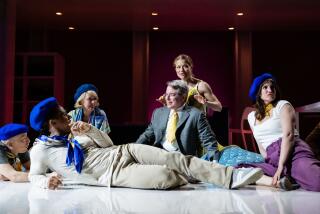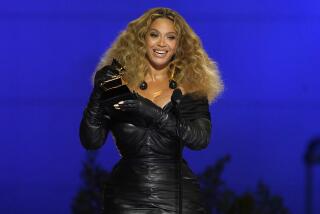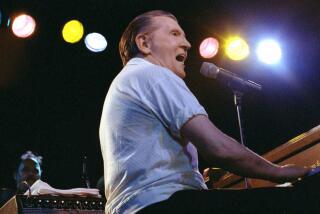Harry Babbitt, 90; Baritone Was Lead Vocalist for Kay Kyser’s Band
- Share via
Harry Babbitt, the Kay Kyser orchestra lead vocalist who sang on such Kyser hits as “Three Little Fishies,” “On A Slow Boat to China” and “Who Wouldn’t Love You,” has died. He was 90.
Babbitt, a longtime Newport Beach resident, died April 9 of age-related causes in a nursing home in Aliso Viejo, said his son Michael.
Dubbed “Handsome Harry” by Kyser, Babbitt sang with the Kay Kyser band from 1938 to about 1949, with time out for service in the Navy from 1944 to 1946.
Known for his warm, high-baritone voice, Babbitt provided vocals on numerous Kyser band hits, including “The White Cliffs of Dover,” “(Lights Out) ‘Til Reveille,” “He Wears a Pair of Silver Wings,” “Jingle, Jangle, Jingle,” “The Umbrella Man” and “Can’t Get Out of This Mood.”
“He was a very unique personality singer,” big band singer Connie Haines told The Times this week. “His was a definite style, but Harry could do a little bit of everything.”
Indeed, Babbitt supplied a comic high voice in “Three Little Fishies,” sung with Kyser female lead singer Ginny Simms, trumpet player-comedian Ish Kabibble and sax player-singer Sully Mason.
Babbitt’s high voice -- a little-girl voice dubbed “Little Audrey” -- was featured on several other Kyser band songs, and he later used it on a solo recording of “All I Want for Christmas Is My Two Front Teeth,” for which he included a lisp.
Babbitt even supplied the raucous laugh on “Woody Woodpecker,” Kyser’s 1948 hit novelty tune.
Kyser archivist Steve Beasley said that Babbitt sang as many serious songs as novelty tunes.
“He came on the scene with a fresh, good-natured, down-to-earth singing approach, which complemented the Kyser band’s informal, folksy atmosphere,” said Beasley, who runs a Kyser website. “He just kind of put a smile on the face of the band.”
As part of the Kyser band, Babbitt also appeared in seven movies that starred Kyser. He also was featured on “Kay Kyser’s Kollege of Musical Knowledge,” a popular comedy-musical radio quiz show on NBC, on which Kyser wore a cap and gown and was dubbed the “Ol’ Professor.” His musicians wore beanies and lettered sweaters for the benefit of the studio audience.
Babbitt was a radio and nightclub performer in his native St. Louis when Kyser’s band arrived on tour. Babbitt later recalled that a lighting man at the show told Kyser, “There’s a kid in town that oughta be singing with you.”
Babbitt auditioned and joined the Kyser band on tour in 1938, playing everywhere from the Waldorf-Astoria in New York to Chicago’s Aragon Ballroom to the Hollywood Palladium. For many years, the Kyser band opened the summer season at the Casino on Catalina Island.
The band was based in Hollywood during World War II, and when not touring, it played nearly every weekend at the Hollywood Canteen, the USO club where stars and starlets volunteered to entertain servicemen.
“We’d really get up for those performances because we felt it was so important,” Babbitt told The Times in 1991. “It was also really important to Kay; he really couldn’t do enough for the GIs.... He even wore GI fatigue boots when we played.”
The band also regularly went on tour to sell war bonds and performed frequently at GI camp shows. The Kyser orchestra disbanded in 1949.
By then, Babbitt was hosting “The Second Cup of Coffee Club,” a popular 15-minute early morning radio show that ran for 10 years on CBS. A television pioneer, he hosted two long-running musical shows on KTLA-TV in Los Angeles: “Bandstand Review” and “Hollywood Opportunity.” He also hosted a short-lived musical show on NBC called “Glamour Girl.”
Babbitt retired from show business in 1964, four years after moving to Newport Beach, where he launched a successful career in real estate.
After the 1985 death of Kyser, an agent urged Babbitt to re-create the Kyser band to capitalize on renewed interest in big band music. Babbitt obtained rights to the band’s name and catalog from Kyser’s widow and toured the country with the new band. He stopped performing in the mid-1990s.
In addition to Michael, Babbitt is survived by his wife of 69 years, Betty; sons Christopher and Stephen; a brother, Bob; six grandchildren; and two great-grandchildren.
A private memorial service will be held in May.
In lieu of flowers, the family suggests donations be sent to the Harry Babbitt Memorial Fund, Boy Scouts of America, Orange County Council, 3590 Harbor Gateway N., Costa Mesa, CA 92626.
More to Read
The biggest entertainment stories
Get our big stories about Hollywood, film, television, music, arts, culture and more right in your inbox as soon as they publish.
You may occasionally receive promotional content from the Los Angeles Times.










